W WPBeginner pomogliśmy tysiącom użytkowników WordPressa w zakładaniu ich stron i często widzimy ten sam błąd: pomijanie struktury permalinków. Wydaje się to drobnostką, ale błędne jej ustawienie może sprawić, że Twoje adresy URL będą niejasne i zmniejszą Twoje szanse na pozycjonowanie w Google.
Wiemy, jak frustrujące jest uczucie, że techniczne ustawienie powstrzymuje Twoją stronę. Dlatego stworzyliśmy ten przewodnik, aby przeprowadzić Cię przez każdy krok, od podstawowych konfiguracji po zaawansowane dostosowania, prostym językiem.
Zacznijmy od tego, aby Twoje adresy URL działały na Twoją korzyść, czyniąc je czystymi, łatwymi do zapamiętania i przyjaznymi dla SEO.
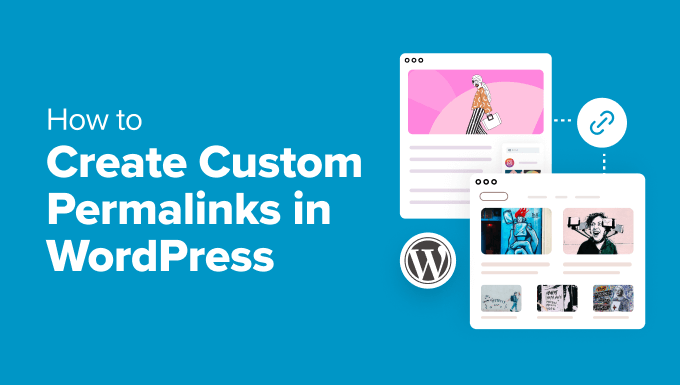
Ponieważ jest to kompleksowy poradnik dotyczący tworzenia niestandardowych stałych linków w WordPress, stworzyliśmy łatwy do nawigacji spis treści:
- Czym jest niestandardowy permalink w WordPressie?
- Jak zmienić strukturę permalinków WordPress
- Jak zmienić prefiks adresu URL kategorii i tagów w WordPress
- Jak zmienić adres URL pojedynczego wpisu lub strony WordPress
- Jak zmienić adres URL kategorii lub tagu WordPress
- Jak zmienić adres URL strony autora w WordPress
- Jak stworzyć całkowicie niestandardowe permalinki w WordPressie
- Jak ustawić przekierowania permalinków i unikać błędów 404
- Najczęściej zadawane pytania dotyczące niestandardowych permalinków
- Dodatkowe zasoby
Czym jest niestandardowy permalink w WordPressie?
W WordPressie permalinki to stałe adresy URL (adresy internetowe) dla wszystkich Twoich treści, w tym wpisów na blogu, stron, kategorii i archiwów. Pomyśl o nich jak o stałym adresie domowym dla każdej treści na Twojej stronie internetowej.
Przyjrzyjmy się dwóm różnym adresom URL tej samej treści, aby zrozumieć, dlaczego permalinki są ważne:
Nowoczesny, przyjazny dla SEO stały link:
https://example.com/best-refrigerators-for-tiny-kitchens/
Stary styl, domyślny permalink:
https://example.com/index.php?p=4556
Jak widać, pierwszy adres URL jest znacznie bardziej przyjazny dla użytkownika i dokładnie informuje zarówno odwiedzających, jak i wyszukiwarki, o czym jest treść. To właśnie mamy na myśli mówiąc o „niestandardowym permalinku”, czyli strukturze adresu URL, którą zoptymalizowaliśmy pod kątem przejrzystości i SEO.
Typowy adres URL WordPressa składa się z kilku części, które będziemy dostosowywać. Dla adresu URL takiego jak example.com/category/my-post, część /category/ to „podstawa” lub „prefiks”, a my-post to „slug”. Zrozumienie tych dwóch terminów sprawi, że reszta tego przewodnika będzie bardzo łatwa. 👍
WordPress oferuje kilka wbudowanych opcji permalinków, które można łatwo skonfigurować za pomocą panelu administracyjnego WordPress. Aby uzyskać dostęp do tych ustawień, przejdź do Ustawienia » Permalinki w obszarze administracyjnym WordPress:
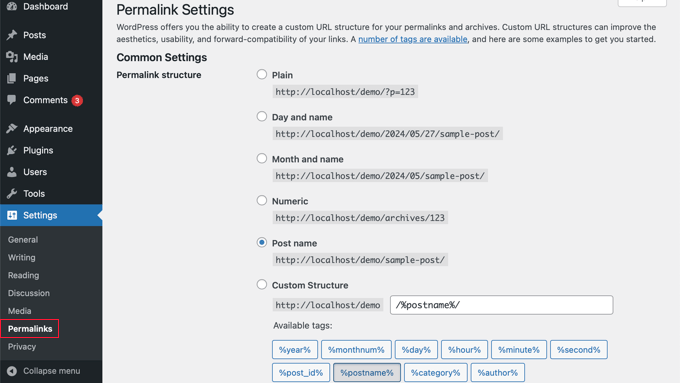
Ale to dopiero początek. WordPress oferuje jeszcze większą elastyczność, jeśli chodzi o dostosowywanie adresów URL:
- Możesz dostosować poszczególne adresy URL dla wpisów, stron i innych typów treści
- Możesz modyfikować struktury adresów URL kategorii i tagów
- Możesz używać wtyczek WordPress do tworzenia zaawansowanych reguł niestandardowych permalinków dla określonych sekcji Twojej witryny
W poniższych sekcjach przeprowadzimy Cię przez wszystkie te opcje, zaczynając od wbudowanych ustawień adresów URL WordPress. Pokażemy Ci dokładnie, jak wybrać i skonfigurować najlepszą strukturę adresów URL dla potrzeb Twojej witryny.
Wskazówka Pro: Gdy już wybierzesz strukturę permalinków, staraj się jej trzymać. Zmiana permalinków na istniejącej stronie może spowodować zerwanie istniejących linków i zaszkodzić Twojemu SEO, jeśli nie zostanie przeprowadzona prawidłowo.
Jak zmienić strukturę permalinków WordPress
Jeśli chcesz zmienić cały schemat generowania adresów URL dla swojej witryny, przejdź do strony Ustawienia » Stałe linki w swoim panelu administracyjnym WordPress, o której wspomnieliśmy powyżej.
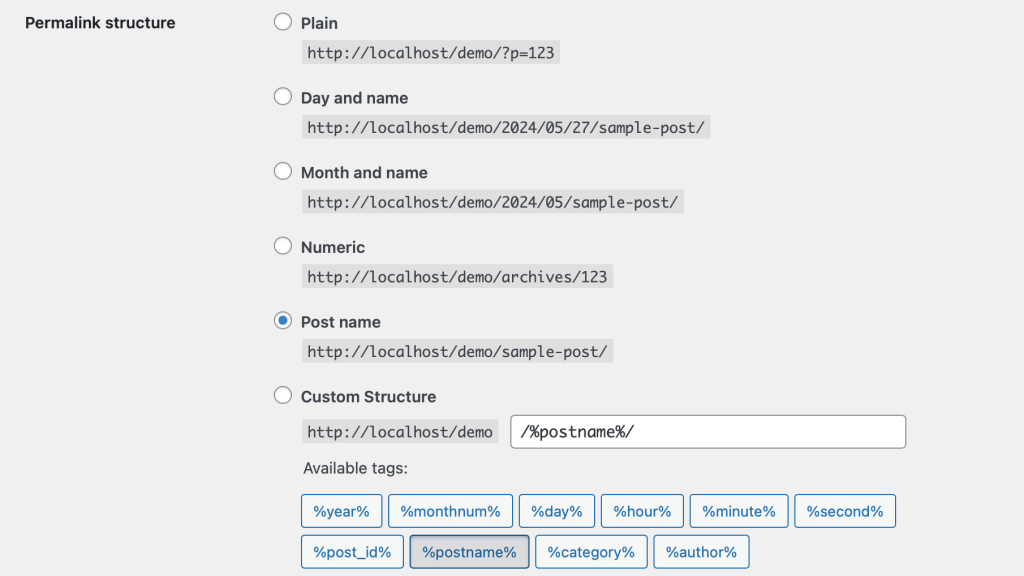
Tutaj możesz wybrać strukturę adresu URL dla poszczególnych wpisów. Możesz również użyć tagów widocznych na ekranie, aby utworzyć niestandardową strukturę adresów URL WordPress.
Na przykład, możesz użyć tytułu posta %postname% i kategorii %category%, a także roku %year%, w którym został opublikowany.
Nie zapomnij kliknąć przycisku „Zapisz zmiany” u dołu strony, aby zapisać swoje zmiany.
Zalecamy używanie struktury adresów URL, która zawiera nazwę posta w adresie URL. Sprawia to, że Twoje adresy URL są bardziej przyjazne dla użytkownika i może poprawić Twoje SEO WordPress.
Upewnij się, że używasz przyjaznych dla SEO stałych linków, takich jak ten, podczas tworzenia nowego bloga lub strony internetowej WordPress.
Jednak jeśli masz istniejącą stronę internetową, która już generuje ruch z wyszukiwarek, zmiana permalinków może zaszkodzić Twoim rankingom SEO.
Jak zmienić prefiks adresu URL kategorii i tagów w WordPress
Domyślnie WordPress używa /category/ jako podstawy dla adresów URL kategorii i /tag/ dla stron tagów.
Oto kilka przykładów:
https://example.com/category/technology/
https://example.com/tag/fintech/
Możesz zmienić te prefiksy bazowe, przechodząc do Ustawienia » Permalinki i po prostu wprowadzając nowe prefiksy. Na przykład, możesz zmienić „kategoria” na „tematy” i „tag” na „hashtag” w ten sposób:

Upewnij się, że klikniesz przycisk „Zapisz zmiany”, aby zaktualizować bazę kategorii i bazę tagów.
Teraz będziesz miał nowe bazy kategorii i tagów aktywne na swojej stronie, takie jak te:
https://example.com/topics/technology/
https://example.com/hashtag/fintech/
Jak zmienić adres URL pojedynczego wpisu lub strony WordPress
Po ustawieniu początkowej struktury permalinków, WordPress będzie jej używał jako szablonu dla wszystkich linków na Twojej stronie.
Możesz jednak również zmienić slug adresu URL w strukturze adresu URL dla poszczególnych wpisów, stron i niestandardowych typów wpisów, aby uczynić go bardziej przyjaznym dla SEO.
Możesz dostosować część adresu URL zwaną „slug” na ekranie edycji posta w edytorze treści WordPress.
Jeśli tworzysz nowy wpis lub stronę, najpierw musisz zapisać go jako szkic. Po zapisaniu WordPress automatycznie wygeneruje początkowy permalink, który następnie możesz edytować.
Następnie po prostu kliknij „URL” w sekcji Podsumowanie ustawień wpisu.
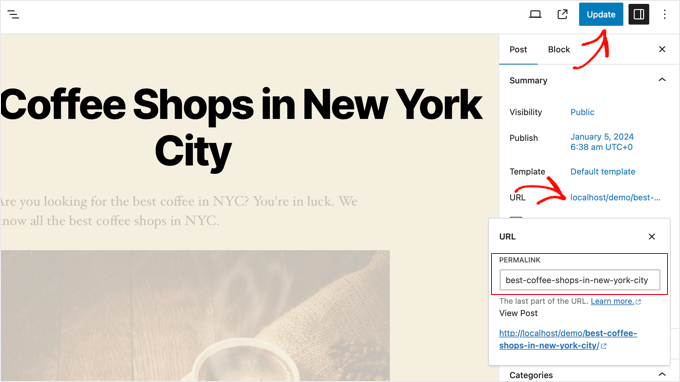
Następnie zmień slug adresu URL wpisu na niestandardowy permalink.
Po zakończeniu kliknij przycisk „Zaktualizuj”, aby zapisać nowy permalink.
Możesz użyć tej metody dla wszystkich typów postów, w tym produktów WooCommerce, stron członkowskich, kursów online i nie tylko.
Jak zmienić adres URL kategorii lub tagu WordPress
W poprzednim kroku pokazaliśmy Ci, jak zmodyfikować prefiks podstawy kategorii i tagów w WordPressie. W tym kroku pokażemy Ci, jak zmienić slug adresu URL dla poszczególnych kategorii lub tagów.
Po prostu przejdź do Posty » Kategorie w swoim panelu WordPress, a następnie kliknij link „Szybka edycja” pod kategorią, którą chcesz dostosować.
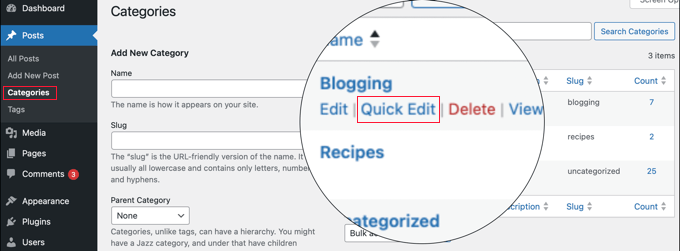
WordPress załaduje teraz szczegóły kategorii.
Stąd możesz zmienić slug kategorii, aby dostosować jej permalink.
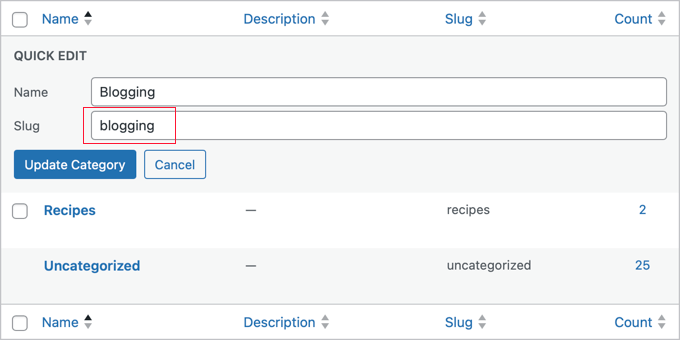
Pamiętaj, aby kliknąć przycisk „Zaktualizuj kategorię”, aby zapisać zmiany „slug” kategorii.
Podobnie, możesz edytować pojedynczy tag, przechodząc do ekranu Wpisy » Tagi i postępując zgodnie z tymi samymi krokami.
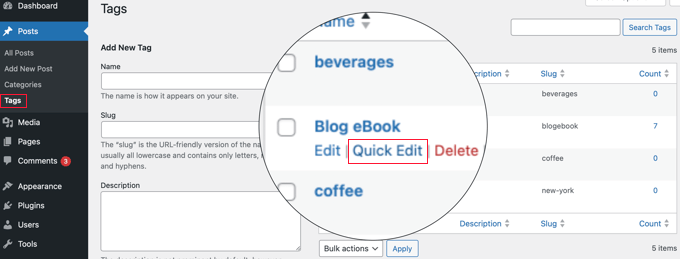
Możesz również edytować dowolne niestandardowe taksonomie, używając tej samej metody, co powyżej.
Jak zmienić adres URL strony autora w WordPress
WordPress automatycznie utworzy adres URL strony autora dla różnych autorów na Twojej stronie. Adresy URL stron autorów wyglądają następująco:
https://example.com/author/jsmith/
W powyższym przykładzie jsmith to slug, a author to baza.
Problem polega na tym, że WordPress nie oferuje opcji zmiany bazowego adresu URL autora ani jego ślimaka. Na szczęście możesz to zmienić za pomocą wtyczki WordPress w kilku kliknięciach.
Pierwszą rzeczą, którą musisz zrobić, jest zainstalowanie i aktywowanie wtyczki Edit Author Slug. Szczegółowe informacje znajdziesz w naszym przewodniku krok po kroku, jak zainstalować wtyczkę WordPress.
Po aktywacji przejdź do strony Użytkownicy » Wszyscy użytkownicy w panelu administracyjnym WordPress. Następnie kliknij link „Edytuj” pod nazwą użytkownika.
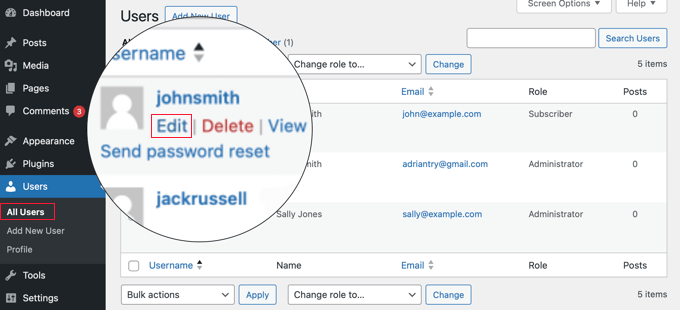
Na następnej stronie przewiń w dół do sekcji „Edytuj ślimak autora”.
Tutaj będziesz mógł wybrać „slug” autora lub dodać własny w polu „Niestandardowy”.
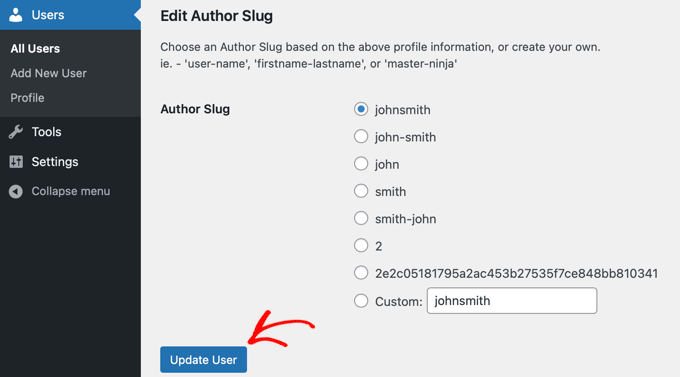
Nie zapomnij kliknąć przycisku „Zaktualizuj użytkownika”, aby zapisać ustawienia permalinków.
Jeśli chcesz zmienić bazę permalinków autora, po prostu przejdź do Ustawienia » Edytuj ślimak autora.
Tutaj zobaczysz opcję zmiany bazy autora, a nawet wybór różnych baz autorów dla użytkowników z różnymi rolami.
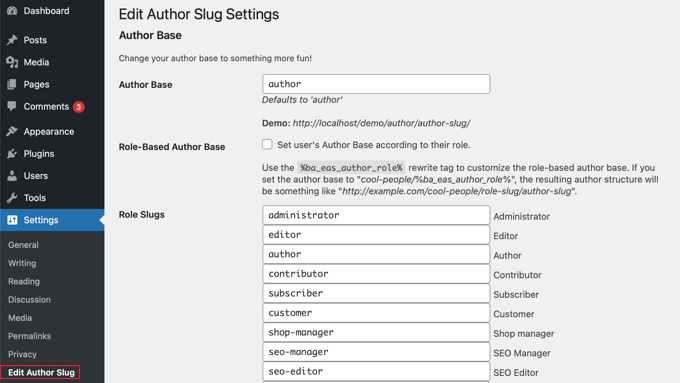
Więcej szczegółów znajdziesz w naszym przewodniku, jak zmienić nazwę autora i bazę w adresach URL w WordPressie.
Jak stworzyć całkowicie niestandardowe permalinki w WordPressie
Wszystkie powyższe metody pozwalają w pewnym stopniu dostosować linki stałe WordPress. Nie pomogą Ci jednak w tworzeniu całkowicie niestandardowych linków stałych.
Dzieje się tak, ponieważ WordPress domyślnie nie oferuje tej funkcjonalności.
Na szczęście istnieje wtyczka, która może pomóc. Jeśli chcesz nadpisać domyślną strukturę adresów URL WordPress dla określonych sekcji Twojej witryny, to jest to dla Ciebie.
Pierwszą rzeczą, którą musisz zrobić, jest zainstalowanie i aktywowanie wtyczki Custom Permalink Editor. Aby uzyskać więcej informacji, zapoznaj się z naszym przewodnikiem dla początkujących na temat jak zainstalować wtyczkę WordPress.
Po aktywacji musisz otworzyć wpis, dla którego chcesz utworzyć niestandardowy stały link.
Następnie, zamiast edytować permalink jak powyżej, znajdziesz opcję utworzenia niestandardowego permalinka poniżej edytora w polu „Edytor niestandardowych permalinków”.
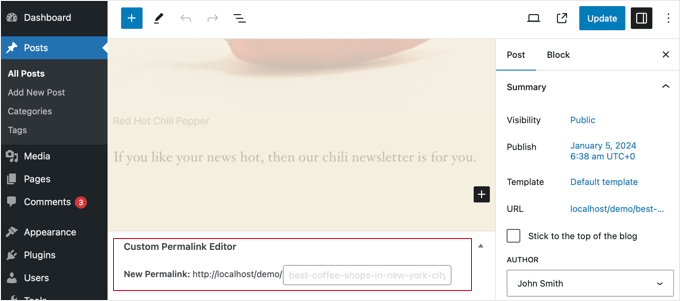
Pozwala to na nadpisanie domyślnej struktury permalinków WordPressa dla pojedynczej treści. Na przykład, powiedzmy, że struktura permalinków Twojej strony jest ustawiona na /topics/%postname%/. Nowy wpis może mieć taki adres URL:
https://example.com/topics/my-awesome-post
Dzięki temu wtyczce możesz zmienić adres URL tego konkretnego wpisu na coś zupełnie innego, na przykład tak:
https://example.com/guides/awesome-post
Masz pełną kontrolę na poziomie pojedynczego wpisu.
Podobnie możesz tworzyć niestandardowe permalinki dla kategorii.
Aby to zrobić, przejdź do strony Wpisy » Kategorie i kliknij link „Edytuj” pod kategorią, którą chcesz zmienić.
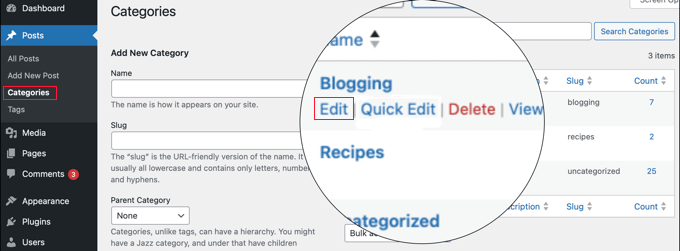
Na stronie szczegółów kategorii znajdziesz opcję utworzenia niestandardowego permalinka dla tej konkretnej kategorii.
Możesz nawet utworzyć adres URL bez prefiksu bazowego kategorii.
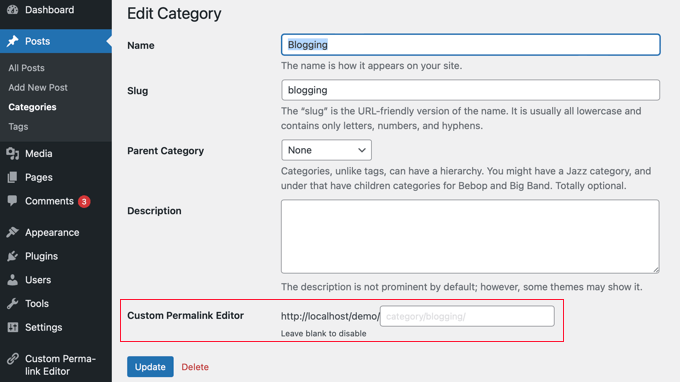
Aby wyłączyć niestandardowy permalink, po prostu pozostaw pole „Edytor niestandardowych permalinków” puste.
Możesz też wyłączyć wszystkie niestandardowe permalinki, po prostu wyłączając wtyczkę.
Jak ustawić przekierowania permalinków i unikać błędów 404
Jeśli dokonałeś zmian w strukturze permalinków, ślimaku autora lub utworzyłeś całkowicie niestandardowe permalinki, możesz napotkać błędy 404.
To duża sprawa dla SEO, ponieważ wszelkie istniejące linki do Twojej witryny z Google lub innych stron internetowych zostaną teraz przerwane. Kiedy tak się stanie, tracisz cenną moc rankingową z tych linków, a Twoi odwiedzający zobaczą frustrującą stronę błędu 404.
Aby to naprawić, musisz skonfigurować przekierowania permalinków ze starych na nowe.
Najprostszym sposobem jest użycie wtyczki All in One SEO. Jest to najlepsza wtyczka SEO dla WordPressa i jest używana przez ponad 3 miliony stron internetowych do poprawy ich SEO.
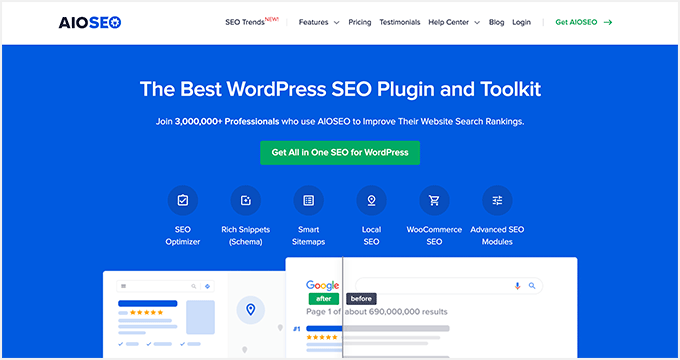
Posiada potężny dodatek do zarządzania przekierowaniami, który pozwala zarządzać przekierowaniami 301 dla Twoich permalinków, śledzić i naprawiać błędy 404 i nie tylko.
Więcej informacji na temat konfigurowania przekierowań permalinków znajdziesz w naszym przewodniku dla początkujących po tworzeniu przekierowań 301 w WordPress.
Po aktywacji możesz zarządzać i tworzyć nowe przekierowania permalinków bezpośrednio z panelu administracyjnego WordPress.

Poza tym AIOSEO pomaga również w śledzeniu stron błędów 404 i ich naprawianiu. Jeśli przegapisz jakieś przekierowania, to pomoże Ci je łatwo znaleźć i naprawić później.
Najczęściej zadawane pytania dotyczące niestandardowych permalinków
Teraz, gdy omówiliśmy, jak tworzyć niestandardowe linki stałe, odpowiedzmy na kilka często zadawanych pytań na ten temat.
Czym są linki stałe w WordPress?
Stałe linki to trwałe adresy URL dla Twoich postów, stron i kategorii WordPress. Określają one, jak Twoje treści są wyświetlane w pasku adresu przeglądarki internetowej i na stronach wyników wyszukiwania (SERP).
Dlaczego powinienem tworzyć niestandardowe stałe linki?
Niestandardowe permalinki mogą być bardziej przyjazne dla użytkownika i SEO. Mogą pomóc ludziom zrozumieć zawartość Twojego posta na podstawie samego adresu URL. Mogą również poprawić ranking Twojej witryny w wynikach wyszukiwania.
Czy mogę zmienić permalink tylko dla jednego wpisu?
Tak, możesz edytować permalink każdego posta indywidualnie z panelu ustawień edytora blokowego WordPress.
Jaka jest najbardziej przyjazna dla SEO struktura permalinków?
Najbardziej polecaną strukturą jest opcja „Nazwa posta”. Ta struktura tworzy adresy URL wykorzystujące tytuł posta. Jest to łatwiejsze do zrozumienia dla ludzi i preferowane przez wyszukiwarki.
Co stanie się z moimi starymi linkami stałymi, jeśli zmienię strukturę?
Po zmianie struktury permalinków zmienią się również adresy URL wszystkich Twoich istniejących postów i stron. Może to wpłynąć na Twoje SEO, jeśli nie skonfigurujesz przekierowań 301.
Czy muszę skonfigurować przekierowania, jeśli zmienię strukturę?
Tak, zdecydowanie zalecamy skonfigurowanie przekierowań, aby zapewnić, że użytkownicy i wyszukiwarki trafią na poprawne adresy URL po zmianie. Wtyczki takie jak All in One SEO i Redirection mogą pomóc w łatwym zarządzaniu przekierowaniami.
Dodatkowe zasoby
Mamy nadzieję, że ten artykuł pomógł Ci dowiedzieć się, jak tworzyć niestandardowe permalinki w WordPress. Możesz być zainteresowany tymi innymi pomocnymi przewodnikami:
- Jak dodać słowa kluczowe i opisy meta w WordPress
- Najlepsze narzędzia do sprawdzania linków zwrotnych (opcje darmowe i płatne)
Jeśli podobał Ci się ten artykuł, zasubskrybuj nasz kanał YouTube po samouczki wideo WordPress. Możesz nas również znaleźć na Twitterze i Facebooku.





Jiří Vaněk
Znałem niektóre ustawienia z WordPressa, ale o niektórych nawet nie wiedziałem, że można je tak dostosować. Na przykład zmiana adresu URL autora za pomocą permalinka wygląda świetnie. Czy można to zrobić inaczej niż za pomocą wtyczki? Chciałbym unikać wielu wtyczek.
Wsparcie WPBeginner
Chociaż jest to możliwe, jest to trudne, dlatego polecamy wtyczkę. W kwestii liczby wtyczek polecamy zapoznać się z naszym poniższym artykułem:
https://www.wpbeginner.com/opinion/how-many-wordpress-plugins-should-you-install-on-your-site/
Admin
Jiří Vaněk
Przeczytałem artykuł. Mam obecnie około 30 wtyczek i wydaje mi się, że to dużo. Chociaż mam własny serwer z 8 GB pamięci RAM dla jednej strony internetowej, staram się stosować pewien kompromis nawet w kwestii aktualizacji WordPress. Im mniej wtyczek, tym mniejsza szansa, że coś się zepsuje podczas aktualizacji. Ale rozumiem. Dziękuję za odpowiedź.
Tasin
Bracie, nie mam edytora permalinków w bocznym pasku edytora postów. Dlaczego tak jest? Używam najnowszej wersji WordPressa. Mogę edytować adres URL w edytorze klasycznym, ale nie w edytorze blokowym.
Wsparcie WPBeginner
Zalecamy sprawdzenie preferencji w edytorze postów, aby upewnić się, że ta sekcja nie jest ukryta, co jest prawdopodobnym powodem.
Admin
Robert
Po dodaniu linku do podkategorii, WP zmienia się na: /?product_cat=
Jak można to zmienić?
Wsparcie WPBeginner
Wygląda na to, że używasz wtyczki eCommerce, powinieneś sprawdzić dalej na stronie permalinków lub w ustawieniach wtyczki, aby zmodyfikować te permalinki.
Admin
Vivek
Witaj,
Czy aby moja strona z wiadomościami znalazła się na liście Google News, muszę używać stałego linku w stylu nazwa-postu-ID-postu?
Ponieważ widzę, że większość stron informacyjnych używa tego formatu?
Wsparcie WPBeginner
Chociaż nie jest to wymagane, jest to normalne preferowane ustawienie adresu URL.
Admin
Jacob Corbett
Witaj WP Beginner,
Świetny artykuł! Zrobiłem już wiele stron z motywem i chcę zmienić wszystkie ich stałe linki. Za każdym razem, gdy to robię, otrzymuję 404 na zaktualizowanej stronie.
Wsparcie WPBeginner
Prawdopodobnie musiałbyś ponownie zapisać ustawienia permalinków i przekierować stare posty/strony, jeśli byś chciał.
Admin
Haseeb Nazir
Cześć,
Jeśli używamy wtyczki niestandardowych permalinków, czy ma to w jakikolwiek sposób wpływ na SEO naszej strony internetowej?
Wsparcie WPBeginner
Zależałoby to od tego, co zrobisz z wtyczką; użycie wtyczki do dokonania tej samej zmiany, którą zrobiłbyś ręcznie, nie różniłoby się od użycia wtyczki, jeśli o to Ci chodzi.
Admin
Katie
Widzę, że ten post pochodzi pierwotnie z 2016 roku. Czy nadal polecałbyś używanie Custom Permalinks jako wtyczki do tego? Kiedy próbowałem dodać wtyczkę, pojawia się komunikat „Nietestowana z Twoją wersją WordPress”, a ostatnia aktualizacja miała miejsce rok temu. Chętnie dowiem się, czy jest to nadal zalecane.
Wsparcie WPBeginner
W przypadku tego nieprzetestowanego ostrzeżenia, warto zapoznać się z naszym artykułem poniżej, aby poznać naszą opinię na ten temat:
https://www.wpbeginner.com/opinion/should-you-install-plugins-not-tested-with-your-wordpress-version/
Admin
A K P
Cześć,
Mam starą stronę internetową i teraz zmieniam ustawienie „Ustawienia permalinków” z wzorca daty na nazwę wpisu.
czy to zmieni również stare linki?
Strona działa dobrze w Google. Nie chcę zmieniać starych ustawień.
Ale nowy wpis z ustawieniami permalinków „Nazwa wpisu”.
Wsparcie WPBeginner
Link do samego posta by się zmienił, ale linki do posta pod starą lokalizacją nie zostałyby zaktualizowane i spowodowałyby błędy 404 u każdego, kto korzystałby z tych linków.
Admin
swati
naprawdę pomocne, bardzo, bardzo dziękuję.
Wsparcie WPBeginner
You’re welcome
Admin
WONDER APATI
Witam, przeczytałem Twój post o tym, jak migrować z blogera do WordPressa. Jedną z rzeczy, które widzę jako problem, są struktury linków i AdSense.
Zakładając, że migruję z blogera do WordPressa bez ustawiania linku na miesiąc i dzień, jak zaleciłeś w innym poście, ale zamiast tego zdecyduję się edytować każdy post, który zmigrowałem z blogera, aby pasował do miesiąca i dnia, czy to zadziała?
W przeciwnym razie wszystkie inne opublikowane przeze mnie posty zachowają adresy URL postów, z wyjątkiem tych zaimportowanych z blogera (zostaną edytowane, aby pasowały do miesiąca i dnia), czy będzie to w porządku?
Wsparcie WPBeginner
Jeśli zmienisz swoje stałe linki, będziesz musiał utworzyć przekierowania, aby Twoi odwiedzający nie widzieli błędów 404.
Admin
Yolandie
Dziękuję bardzo za pomoc. Buduję swoją stronę dzień po dniu, a te informacje bardzo pomagają
Wsparcie WPBeginner
Glad our guides can help
Admin
Adhyansh Jadli
Dziękuję bardzo za tak miły artykuł. Szukałem sposobu na ustawienie kategorii i tagów. Jestem stałym obserwatorem Twojego bloga i kanału na YouTube.
To najlepsza platforma, jaką kiedykolwiek widziałem, która dostarcza szczegółowych informacji dla początkujących takich jak ja.
Pomogłeś mi skonfigurować mojego WordPressa.
Dziękuję bardzo, panie SYED BALKHI
Adhyansh Jadli
Wsparcie WPBeginner
You’re welcome, glad our content can be helpful
Admin
Pawan Khadka
Czy są jakieś posty, które prowadzą mnie do tworzenia przykładów adresów URL opartych na zapytaniach, na przykład:
Treść główna: example.com/this-is-my-post (Strona z główną treścią)
Strona pobierania: example.com/this-is-my-post?download (strona z linkami do pobrania)
Wsparcie WPBeginner
O ile nie usłyszę inaczej, nie mamy zalecanej metody konfiguracji tego rodzaju permalinks
Admin
Couper
Czy jest jakiś sposób, aby usunąć /home z końca mojego adresu URL bez wtyczek w wersji Premium?
Wsparcie WPBeginner
Jeśli masz na myśli, że jest na każdej stronie, to powinieneś zajrzeć do: https://www.wpbeginner.com/wp-tutorials/how-to-get-rid-of-wordpress-from-your-wordpress-site-url/
Admin
Marina28
Co możemy zrobić z adresami URL, które nie są wpisami ani stronami, na przykład w wtyczce forum, którą osadziłem, nie mogę edytować adresów URL dla niej. Czy istnieje jakiś plik w WordPressie, w którym mogę edytować każdy adres URL??
Wsparcie WPBeginner
W tej sprawie powinieneś skontaktować się z pomocą techniczną tej konkretnej wtyczki, aby dowiedzieć się, jak zmodyfikować permalinki dla jej dodatków.
Admin
Ferdin Norbert
Cześć, świetny post. Obecnie pracuję nad projektem, w którym chciałem zmienić wbudowaną zakładkę o nazwie promocje i zrobiłem to programowo. Udało mi się zmienić nazwę zakładki promocje na zakładkę Powiadomienia. Ale jedyne, co pozostało, to jej stały link. Chcę zmienić MojeKonto/Promocje na MojeKonto/Powiadomienia. Czy jest jakiś sposób, aby to osiągnąć? Proszę o jak najszybszą odpowiedź.
Dziękuję
Wsparcie WPBeginner
Zależałoby to od tego, co tworzy konto, jeśli skontaktujesz się z pomocą techniczną wtyczki, której używasz, powinni być w stanie Cię poinformować.
Admin
Quy
Doskonały artykuł!
Wsparcie WPBeginner
Thanks!
Admin
ASHOK KUMAR SONAWAT
Dzięki, dzisiaj mój problem został rozwiązany po przeczytaniu tego artykułu...
Wsparcie WPBeginner
You’re welcome
Admin
Alex Hoyle
Witam. Właśnie zrobiłem stronę WordPress dla mojego bloga. Jak zmienić permalink, aby używał głównej domeny zamiast zaczynać się od temp.domain?
Wsparcie WPBeginner
You would want to check under Settings>General to see what your domain is set as, if it is on your temporary domain there then normally you can reach out to your hosting provider to help you update from your temporary domain to the correct address without issue
Admin
The Thus
Witaj WPBeginner,
Skonfigurowałem i ustawiłem wszystko zgodnie z Twoim artykułem, ale moje artykuły nadal pojawiają się w Google w domenie domain.com/category. Czy możesz mi powiedzieć, jak rozwiązać ten problem??
Wsparcie WPBeginner
Google mógł zbuforować starą strukturę, jeśli ją zmieniłeś. Możesz użyć narzędzia Google do usuwania adresów URL, jeśli chcesz usunąć te wyniki z wyszukiwania Google.
Admin
Geet
Chciałbym tak ustrukturyzować moją nową stronę internetową –
my-company.com/strona-glowna
my-company.com/strona-glowna/artykul-pomocniczy-1
my-company.com/strona-glowna/artykul-pomocniczy-2
my-company.com/strona-glowna/artykul-pomocniczy-3
Czy można utworzyć taką strukturę za pomocą wtyczki „Niestandardowe permalinki”?
Wsparcie WPBeginner
Wtyczka powinna pozwolić Ci zmienić permalink na cokolwiek, więc powinna być w stanie skonfigurować tę strukturę permalinków.
Admin
Mike Coleman
Mam nową stronę internetową (jeszcze nieopublikowaną) i chcę mieć stronę główną. Jednakże, gdy próbuję utworzyć stronę z samym tym adresem URL, Permalinks dodaje do adresu URL niewytłumaczalną liczbę, np. – example.com.au/123-2.
Próbowałem zmienić ustawienia Permalinks, ale to zmienia kod po / na to, co dyktują ustawienia.
Jak utworzyć stronę z samym adresem URL i bez / ani dodatków po /?
Pozdrawiam
Mike
Wsparcie WPBeginner
If you want to have a specific page appear when it is just the url without the slashes then you would set the home page under Settings>Reading
Admin
Geetanjali
Cześć, przeniosłem mój blog z Bloggera na WordPressa. Moje permalinki są ustawione na miesiąc i post. Ale teraz dla nowego posta chcę, aby permalink był tylko post. Po przeczytaniu tego artykułu zainstalowałem wtyczkę Custom Permalinks, ale podczas edycji nowego posta nie widzę opcji zmiany miesiąca i posta ze sluga. Proszę o sugestię, co można zrobić, aby zmienić permalink nowego i przyszłych postów na tylko post zamiast miesiąca i postu.
Tucker Daugh
Deweloperzy kazali mi nie zmieniać permalinków na poziomie „EDYTUJ”. Mam kilka stron na stronie, którą pomogłem zbudować, które naprawdę skorzystałyby na zmianie nazwy. Coś, co odzwierciedla to, czego może szukać dana osoba, w przeciwieństwie do czegoś, co próbowaliśmy być sprytni. Więc pytanie: Co powoduje „zepsucie” permalinków, jeśli zmienisz je na tym etapie edycji (kiedy otwierasz stronę i widzisz adres URL). Zakładam, że jeśli będę ostrożny i zrobię_coś_takiego, to wszystko jest w porządku, prawda?
Wsparcie WPBeginner
Cześć Tucker,
Kiedy zmieniasz adres URL strony, edytując ją, strona będzie działać poprawnie w Twojej witrynie. Jednak Twój stary adres URL zostanie zaindeksowany przez wyszukiwarki i nie będą one w stanie go znaleźć. Jeśli musisz zmienić stały link istniejącej strony, musisz skonfigurować przekierowanie.
Admin
Talkgeria
Dziękuję za udostępnienie tego pomocnego postu.
Mój problem polega na tym, że moje posty na blogu wyświetlają się jako mysite.com/kategoria zamiast mysite.com/nazwa-postu w wynikach wyszukiwania, ale wyświetlają nazwę posta po kliknięciu. Moje pytanie brzmi, jak sprawić, aby nazwa posta pojawiła się również w wynikach wyszukiwania?
kenneth khayyam
miły artykuł, bardzo pomocny dla początkujących
Vidya
Cześć
Mam stronę, która porównuje różne produkty. Stały link do niej to /page-name/?compareids=1,2,3
Czy możesz mi zasugerować, jak dostosować stały link tego typu stron, aby wyświetlał się jako: /page-name/compare-productname1-vs.-productname2-vs.-productname3
Prashant Chevale
Witaj Zespole,
Mam pytanie,
1. Jak zaimplementować słowa kluczowe w adresie URL przed utworzeniem posta i po jego utworzeniu?
2. Jak zaimplementować słowa kluczowe w adresach URL postów bez powodowania błędu 404 w WordPressie?
3. Jak zoptymalizować adresy URL bez powodowania błędu 404?
4. Chcę dostosować permalink (wstawić słowo kluczowe w adres URL) bez żadnych błędów, jak mogę to ustawić?
proszę pomóż mi...
Dziękuję.
Orit Adar
Cała moja witryna jest nadal w konserwacji, ale większość moich wpisów jest zdefiniowana jako „opublikowane” w tym ustawieniu. Jeśli chcę zmienić slugi, czy mogę tymczasowo przywrócić status do „szkicu”, zmienić slug, a następnie ponownie „opublikować”? Chyba nie rozumiem znaczenia słowa „opublikować”, dopóki strona nie jest aktywna, ale pomaga to lepiej widzieć posty, tak jak zrobiłem. Dziękuję.
Wsparcie WPBeginner
Cześć Orit,
Jeśli Twoja witryna nie jest aktywna, a Twoje treści nie są indeksowane przez wyszukiwarki, możesz również zmienić slug (końcówkę adresu URL) istniejącej strony/wpisu.
Admin
Adell
Moja strona jest nowa i w budowie - nie jest na żywo. Stworzyłem kilka postów i je opublikowałem, ale moja strona nie jest na żywo. Czy mogę nadal zmieniać slug, permalinki i tagi kategorii bez potrzeby wtyczki do przekierowań?
Czy można bezpiecznie wprowadzać zmiany w adresach URL, dopóki moja strona nie jest aktywna (nawet jeśli kliknąłem „publikuj”)?
Czy potrzebuję tylko wtyczki do przekierowań, jeśli wprowadzę zmiany w permalinkach po uruchomieniu strony?
dziękuję!!
Nnamdi
Chciałbym wiedzieć, jak utworzyć nazwę strony przed adresem URL strony, na przykład customname.yoursitename.com. Nie wiem, jak inaczej to opisać, przepraszam za wszelkie nieporozumienia.
Wsparcie WPBeginner
Cześć Nnamdi,
Nazywa się to subdomenami. Wcale nie są podobne do stron. W rzeczywistości subdomena może być zupełnie inną stroną internetową, korzystającą z tej samej domeny głównej.
Admin
Brandy
Cześć, kiedy wykonuję ten proces, /blog nie pojawia się w okruszkach. Co mogę zrobić?
Chcę, aby mój blog:
example.com/blog/kategoria/wpis-1
i okruszki:
Strona główna > Blog > Kategoria > Post-1
Jak mogę dodać > Blog do moich okruszków?
Chyba się nie pojawia, ponieważ / blog jest skonfigurowany sztucznie. Czy jest jakiś sposób, aby uczynić go hierarchicznym?
Jaymi V
Moja struktura linków stałych jest ustawiona na typ posta. Po opublikowaniu strony i przypisaniu jej do strony nadrzędnej w celu użycia menu bocznego strony nadrzędnej, po zaktualizowaniu strony dodaje się kolejny link do struktury adresu URL — na przykład, oryginalny adres URL strony to: example.com/acctg/new-page
Po przypisaniu jej do mojej strony docelowej księgowości i zaktualizowaniu strony adres URL staje się:
example.com/acctg/accounting/new-page
Jeśli usunę dodatkowy /accounting z linku stałego, strona będzie wyświetlana jako pusta strona, chyba że odepnę ją od strony docelowej /accounting i utworzę jej własne menu boczne.
Czy istnieje obejście tego problemu?
Francis
Proszę, dodałem ID posta do mojego permalinka posta. Ale chcę zmienić strukturę mojego permalinka na /kategoria/nazwa_posta, ale obawiam się, że stary link przestanie działać i mogę przez to stracić moją pozycję w Google.
Chcę zmienić ID posta *956* na kategorię posta. Ale jak mogę przekierować stary adres URL na nowy po dokonaniu zmian? Proszę o pomoc.
Hassanein
Cześć, dzięki za przydatny artykuł, mam pytanie, na moim blogu WordPress, kiedy klikam na tytuł posta, daje mi poprawny permalink (tylko nazwa posta), ale kiedy klikam na (czytaj dalej) daje ten sam permalink, ale z dodatkowymi kodami! Jak mogę sprawić, aby był podobny bez dodatkowych rozszerzeń? Tylko nazwa posta bez żadnych dodatków?
Valente
Witaj, mam już stronę internetową w WordPressie i używam motywu z opcjami strona główna, strona, o nas itp. Dodałem WooCommerce, gdzie WooCommerce ma własną strukturę permalinków. Moje permalinki WP są ustawione na stronę statyczną %post%
Sklep WooCommerce nie jest stroną główną…
Czy powinienem zostawić permalinki WP bez zmian? I jak powinienem ustawić permalinki i ustawienia czytania WooCommerce?
Wsparcie WPBeginner
Cześć Valente,
WooCommerce nie wpłynie na strukturę permalinków Twojej witryny.
Admin
AmeerTarin
Dobry wieczór,
Mam działającą stronę internetową od kilku lat. Teraz chcę użyć permalinka wygenerowanego przez WordPress dla mojej strony, aby publikować artykuły. Mam umieszczone pliki .htaccess i index.php. Teraz pytanie? Jak używać mojego niestandardowego permalinka dla nowej strony? Czy kopiuję link i wklejam go w pasek adresu. Czy może jak to działa? Utknąłem na tym ostatnim etapie. Proszę o pomoc. Wielkie dzięki
Ameer
balu
Czy nie ma sposobu na tworzenie niestandardowych permalinków bez wtyczki.
Donna
Bez wtyczki slug zawsze ma na końcu „-2”, jakby był kopią. Ale z wtyczką nie będzie miał „-2”. Jak mogę to zrobić
Dor
Cześć
Jeśli zmienię tytuł statycznej strony głównej, czy powinno to wpłynąć na adres URL?
Wsparcie WPBeginner
Cześć Dor,
Jeśli opublikowałeś stronę główną, nie wpłynie to na adres URL. Jednak jeśli strona jest nadal zapisana jako szkic i nigdy nie została opublikowana, zmiana tytułu zmieni slug adresu URL. Możesz jednak kliknąć na slug adresu URL na ekranie edycji strony i zmienić go z powrotem.
Admin
Carlos
Dziękuję za to!!
Karunakar
Jak dodać prefiks lub sufiks do permalinków wszystkich ślimaków post_tag?
Ayumi Higashi
Nie widzę przycisku edycji, aby zmienić permalinki na stronach postów… dlaczego?
Hannen
I want to get get rid of the permalink altogether. I don’t want the titles to have a link. Is there a way to do that?
Thank you
Wsparcie WPBeginner
Tak, jednak większość motywów WordPressa jest zaprojektowana tak, aby miały permalinki. Prawdopodobnie będziesz musiał stworzyć niestandardowy motyw, który spełni Twoje potrzeby, lub dostosować istniejący starter theme.
Admin
Hannen
Dzięki! Już myślałem, że wybrałem prosty układ ('Maker'), ale przyjrzę się motywom startowym.
Ravi
Proszę, pomóż mi,
Chcę permalink jak ten
example.com/kategoria/nazwa_wpisu
Jak mogę to ustawić?
proszę pomóż mi...
Sue Jonas
Mam nowo zbudowaną stronę i wszystkie opcje permalinków wyglądają tak: example.com/wordpress/xyz opcje
Nie mogę znaleźć żadnej bez słowa ‘wordpress’ w środku. Czy zrobiłem coś źle? Jak mogę to naprawić? Dziękuję
Wsparcie WPBeginner
Zapoznaj się z naszym przewodnikiem jak pozbyć się /wordpress/ z adresu URL Twojej witryny WordPress.
Admin
Jean-Francois Mayer
Dziękuję. To rzeczywiście dobry opis. Jednak jest jeden aspekt, którego nie wspominasz: co dzieje się z niestandardowymi adresami URL w przypadku zmiany struktury permalinków.
Obecnie przenoszę stronę we francuskim języku do WP. Kiedy tytuły są zbyt długie lub zawierają apostrofy (które powodują, że dwa słowa stają się jednym, gdy slugi są automatycznie tworzone), skróciłem je.
Po utworzeniu wielu moich niestandardowych permalinków zdecydowałem, że wolę, aby permalinki podążały za strukturą w schemacie rok-miesiąc-dzień, tj. .../2016/08/15/... zamiast .../2016/08/...
Łatwo zrobione… ale wszystkie moje modyfikacje zniknęły!
Odtworzę je. Ale wtedy, jak upewnić się, że moje niestandardowe permalinki pozostaną, nawet jeśli zdecyduję się ponownie zmienić strukturę permalinków przed uruchomieniem strony?
Powinien istnieć sposób lub wtyczka – ale jeszcze jej nie znalazłem.
Wsparcie WPBeginner
Slugi nie powinny być zmieniane podczas aktualizacji struktury permalinks. Są one przechowywane w bazie danych i zostaną ponownie użyte, gdy użyjesz struktury permalinks, która używa nazwy wpisu w adresie URL zamiast ID.
Admin
Jean-Francois Mayer
Dziękuję bardzo za odpowiedź.
Tak, faktycznie spodziewałem się, że niestandardowe slugy nie zmienią się po zaktualizowaniu struktury permalinków… ale tak się stało, z powodów, których nie rozumiem i nie ośmielę się ponownie tego testować. Może to mieć związek z faktem, że wiele postów zostało zaimportowanych z innego CMS w sposób zautomatyzowany, co skutkowało numerycznymi slugami, które udało nam się odtworzyć (za pomocą Permalink Manager), aby doprowadzić je do standardowych slugów. Być może miało to nieoczekiwane konsekwencje, gdy zmiany w ustawieniach wprowadzono na późniejszym etapie.
Tak czy inaczej, dobrze wiedzieć, że nie jest to częste zachowanie i prawdopodobnie spowodowane czymś innym. Ale w przyszłości będę niezwykle ostrożny przy każdej zmianie struktury permalinków!
Logen
Ostatnie niskie oceny, nieaktywne fora wsparcia i brak odpowiedzi od autora sprawiają, że waham się przed użyciem Custom Permalinks. Czy ktoś miał z tym problemy, biorąc pod uwagę, że ostatnia aktualizacja wtyczki miała miejsce 7 miesięcy temu?
nate
Zaktualizowano 1 miesiąc temu
mansuri
znakomity post sir
Aseel
Great articel
Thanks
Stefano
Naprawdę interesujące. Wielkie dzięki za dobre materiały. Na pewno spróbuję, ponieważ muszę zarządzać kategoriami, podkategoriami i wieloma tagami.